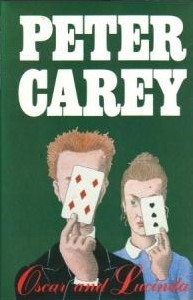 First edition (Australia) | |
| Author | Peter Carey |
|---|---|
| Cover artist | Pierre Le-Tan |
| Language | English |
| Genre | Novel |
| Set in | England and New South Wales, 1838–1866 and 1970 |
| Publisher | University of Queensland Press (UQP) |
Publication date | 1988 |
| Publication place | Australia |
| Media type | Print (hardback, Paperback) |
| Pages | 528 pp |
| ISBN | 0-7022-2116-3 |
| OCLC | 21002433 |
| 823.914 | |
| LC Class | MLCM 91/08820 (P) PR9619.3.C36 |
| Preceded by | Illywhacker |
| Followed by | The Tax Inspector |
Oscar and Lucinda is a novel by Australian author Peter Carey. It won the 1988 Booker Prize the year it was released, and the 1989 Miles Franklin Award. [1] It was shortlisted in 2008 for The Best of the Booker, in celebration of the prize's 40th anniversary. [2] [3]